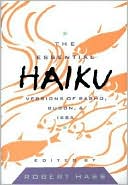Last week, I did some reading online on the Japanese poetic forms/traditions of Renga (collaborative poems) and Jesei (death poems). Then, in my Creative Writing lecture that same week, we had an unannounced special presentation by someone who works here at YSJ and who writes (see below) and is involved with Tanka (Japanese for "short poem") poetry. It was an interesting and inspiring introduction to Tanka poetry and has in the week or so since kept up my interest in learning about this 1300-year-old tradition. I hope to be able to experiment some myself with these forms for my class's final portfolio project.

Anyways, right after class, I went over to the library and checked out a few anthologies: one of specifically modern Tanka poetry, one a collection of the more popular Haiku form, and one more historically-focused anthology by Penguin Books. I would especially recommend the first of these, "Modern Japanese Tanka" edited and translated by Makoto Ueda, especially its easy-to-read and highly-informative Introduction.
Hanging from the bows
Of an old rusty vessel
Tied to the pier,
The black shadow of a cross
falls on the neon red sea.
I've since talked a little more to Mr. Nakamura (he very kindly gave me a free copy of his book) in order to write a short piece on it and Tanka poetry in general, perhaps for "Chimes" or something like that. It was very encouraging to discover this unique resource and opportunity amidst the new, sometimes stifled-seeming academic atmosphere here at YSJ. I would point anyone that might be interested in Tanka poetry to the homepage of the society Mr. Nakamura heads up: Anglo-Japanese Tanka Society.
Recent Titles
Recent Titles
2.11.2008
Tanka, Renga, Jesei
posted by
Ryan Weberling
at
11:13 AM
![]()
labels: class-related, contemporary, poetry, project-related
Subscribe to:
Post Comments (Atom)

1 comment:
You will be pleased to know that you can learn a lot about tanka at TankaCentral.com. It has links to many journals (some of which can be read free online) and websites.
Post a Comment